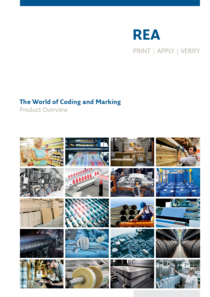Inkjet marking of wood, wood products and pallets
Spruce or beech, thin construction timber slats or entire tree trunks: the wood industry needs suitable coding and marking systems for each of the versatile wood surfaces. We offer a suitable inkjet marking solution for every type of wood and processing method - adapted to the production conditions on site.

Cost-effective: direct marking with ink
INKJET MARKING OF WOOD SURFACES
Markings and codes on wood are applied directly during the manufacturing process in the saw, planer or other woodworking machine. Markings such as the product name and the place, date and time of production make it possible to determine the origin and traceability of the product. Legislation and trade associations require further markings such as the CE mark, DIN standard, grading classes and other quality seals. The manufacturer's logo is also often printed directly on the product. As wood is very absorbent and can be irregular, the printing system has to be very well matched to the respective surface.
in addition, we also design our printing systems for marking wood to withstand the high levels of wood dust, fluctuating temperatures in wood processing plants and the often strong vibrations of the machines. Our large character printers (inkjet) cope particularly well with these challenging conditions and are also cost-effective to purchase and maintain. If a visually high-quality print image is required, for example for logos, high-resolution inkjet printers are suitable for marking wood.
What is important for inkjet coding and marking solutions for wood?
- Reliable work in dusty environments (IP protection class 65)
- Easy integration into saws and wood processing machines
- High marking speed for high cycle rates
- Flexibility for adaptation to changing wood types and products
- Standard-compliant marking, e.g. for pallets (EPAL mark, IPPC logo)
Euro pallets are one of the most important tools for industry and trade and are made entirely of wood. They are marked according to the specifications of the European Pallet Association e.V. (EPAL). EPAL organizes the international Euro pallet exchange pool. Every pallet registered there has to bear the EPAL mark and the IPPC logo on the pallet blocks. A QR code also has to be affixed to the wooden pallet for serialization and traceability. While a brand stamp was usually used for pallet marking in the past, more and more pallet manufacturers are now switching to inkjet printing systems. This is the only way to easily apply the required variable data for traceability. Inkjet Printers also consume less energy than the burning method and the risk of fire in the often dusty environment is significantly reduced. We offer inkjet printing systems and inks certified and approved by EPAL.

Industrial inkjet coding and marking solutions are used throughout the wood processing industry. They are used to mark tree trunks as well as boards, timber, panels, construction timber, packaging wood and pallets. As integrated systems, our coding and marking systems are optimally adapted to the respective marking requirements and thus support the quality standards in the wood industry.
Application examples for wood marking
- Position markings on logs, boards and panels
- Quality class and quality markings on solid wood
- Printing of large logos on the edge surfaces of stacking material
- Edge marking of material boards with batch number, standardization, trade shows, CE mark
- Feather or edge lettering in small print on plywood
- End face labeling of beams
- Markings for the processing process on solid wood (saw protection markings, strength classes)
- Marking of packaging wood and pallets in accordance with legal requirements

Discover the various application possibilities of our industrial-strength inkjet coding and marking solutions. They enable process-reliability and automation in the woodworking industry.

EPAL organizes the EPAL Euro pallet exchange pool and contributes to the safety, quality and sustainability of international supply chains with standardized pallets made from the renewable raw material wood. There are currently around 650 million EPAL pallets in circulation. These and other EPAL load carriers are produced and repaired by over 1,600 EPAL licensees.
The International Plant Protection Convention (IPPC) prints the heat treatment of wood packaging to eliminate possible pests in the wood. This is intended to prevent them from spreading to other ecosystems. The treated packaging and pallets are marked with an IPPC logo and the manufacturer's license number.
















